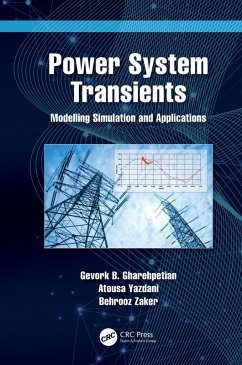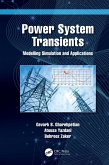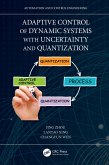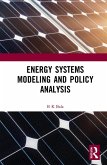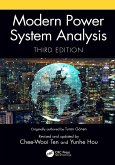Gevork Gharehpetian, Atousa Yazdani, Behrooz Zaker
Power System Transients (eBook, ePUB)
Modelling Simulation and Applications
48,95 €
48,95 €
inkl. MwSt.
Sofort per Download lieferbar

24 °P sammeln
48,95 €
Als Download kaufen

48,95 €
inkl. MwSt.
Sofort per Download lieferbar

24 °P sammeln
Jetzt verschenken
Alle Infos zum eBook verschenken
48,95 €
inkl. MwSt.
Sofort per Download lieferbar
Alle Infos zum eBook verschenken

24 °P sammeln
Gevork Gharehpetian, Atousa Yazdani, Behrooz Zaker
Power System Transients (eBook, ePUB)
Modelling Simulation and Applications
- Format: ePub
- Merkliste
- Auf die Merkliste
- Bewerten Bewerten
- Teilen
- Produkt teilen
- Produkterinnerung
- Produkterinnerung

Bitte loggen Sie sich zunächst in Ihr Kundenkonto ein oder registrieren Sie sich bei
bücher.de, um das eBook-Abo tolino select nutzen zu können.
Hier können Sie sich einloggen
Hier können Sie sich einloggen
Sie sind bereits eingeloggt. Klicken Sie auf 2. tolino select Abo, um fortzufahren.

Bitte loggen Sie sich zunächst in Ihr Kundenkonto ein oder registrieren Sie sich bei bücher.de, um das eBook-Abo tolino select nutzen zu können.
In this textbook, variety of transient cases occurred or possible to occur in power systems are discussed and analyzed. It starts by categorizing transients' phenomena and specifying unfavorable situations in power systems raised by transients.
- Geräte: eReader
- ohne Kopierschutz
- eBook Hilfe
- Größe: 22.27MB
Andere Kunden interessierten sich auch für
![Power System Transients (eBook, PDF) Power System Transients (eBook, PDF)]() Gevork GharehpetianPower System Transients (eBook, PDF)48,95 €
Gevork GharehpetianPower System Transients (eBook, PDF)48,95 €![Adaptive Control of Dynamic Systems with Uncertainty and Quantization (eBook, ePUB) Adaptive Control of Dynamic Systems with Uncertainty and Quantization (eBook, ePUB)]() Jing ZhouAdaptive Control of Dynamic Systems with Uncertainty and Quantization (eBook, ePUB)48,95 €
Jing ZhouAdaptive Control of Dynamic Systems with Uncertainty and Quantization (eBook, ePUB)48,95 €![Energy Systems Modeling and Policy Analysis (eBook, ePUB) Energy Systems Modeling and Policy Analysis (eBook, ePUB)]() B K BalaEnergy Systems Modeling and Policy Analysis (eBook, ePUB)55,95 €
B K BalaEnergy Systems Modeling and Policy Analysis (eBook, ePUB)55,95 €![Power Transformer Design Practices (eBook, ePUB) Power Transformer Design Practices (eBook, ePUB)]() Fang ZhuPower Transformer Design Practices (eBook, ePUB)49,95 €
Fang ZhuPower Transformer Design Practices (eBook, ePUB)49,95 €![Electric Machines (eBook, ePUB) Electric Machines (eBook, ePUB)]() Ion BoldeaElectric Machines (eBook, ePUB)49,95 €
Ion BoldeaElectric Machines (eBook, ePUB)49,95 €![Modern Power System Analysis (eBook, ePUB) Modern Power System Analysis (eBook, ePUB)]() Chee-Wooi TenModern Power System Analysis (eBook, ePUB)140,95 €
Chee-Wooi TenModern Power System Analysis (eBook, ePUB)140,95 €![Electrical Power Generation (eBook, ePUB) Electrical Power Generation (eBook, ePUB)]() Dhruba J. SyamElectrical Power Generation (eBook, ePUB)48,95 €
Dhruba J. SyamElectrical Power Generation (eBook, ePUB)48,95 €-
-
-
In this textbook, variety of transient cases occurred or possible to occur in power systems are discussed and analyzed. It starts by categorizing transients' phenomena and specifying unfavorable situations in power systems raised by transients.
Dieser Download kann aus rechtlichen Gründen nur mit Rechnungsadresse in A, B, BG, CY, CZ, D, DK, EW, E, FIN, F, GR, HR, H, IRL, I, LT, L, LR, M, NL, PL, P, R, S, SLO, SK ausgeliefert werden.
Produktdetails
- Produktdetails
- Verlag: Taylor & Francis eBooks
- Seitenzahl: 248
- Erscheinungstermin: 27. Januar 2023
- Englisch
- ISBN-13: 9781000825763
- Artikelnr.: 66724675
- Verlag: Taylor & Francis eBooks
- Seitenzahl: 248
- Erscheinungstermin: 27. Januar 2023
- Englisch
- ISBN-13: 9781000825763
- Artikelnr.: 66724675
- Herstellerkennzeichnung Die Herstellerinformationen sind derzeit nicht verfügbar.
G. B. Gharehpetian received his PhD degree in electrical engineering in 1996 from Tehran University, Tehran, Iran, graduating with First Class Honors. As a PhD student, he has received scholarship from DAAD (German Academic Exchange Service) from 1993 to 1996 and he was with High Voltage Institute of RWTH Aachen, Aachen, Germany.
He has been holding the Assistant Professor position at AUT from 1997 to 2003, the position of Associate Professor from 2004 to 2007 and has been Professor since 2007.
He was selected by the MSRT (Ministry of Science Research and Technology) as the distinguished professor of Iran, by IAEEE (Iranian Association of Electrical and Electronics Engineers) as the distinguished researcher of Iran, by Iran Energy Association (IEA) as the best researcher of Iran in the field of energy, by the MSRT as the distinguished researcher of Iran, by the Academy of Science of the Islamic Republic of Iran as the distinguished professor of electrical engineering, by National Elites Foundation as the laureates of Alameh Tabatabaei Award and was awarded the National Prize in 2008, 2010, 2018, 2018, 2019 and 2019, respectively. Based on the Web of Science database (2005-2019), he is among world's top 1% elite scientists according to ESI (Essential Science Indicators) ranking system.
He is the author of more than 1200 journal and conference papers. His teaching and research interests include Smart Grid, Microgrids, FACTS and HVDC Systems, Monitoring of Power Transformers and its Transients.
Atousa Yazdani is an Associate Professor with California State University, Sacramento. She has received her PhD from Missouri University of Science and Technology in 2009. She has received her MSc and BSc in Tehran Polytechnics (2001) and Tehran University (1997), respectively. She has been involved with several consulting projects both in USA and abroad. She has been instrumental in several utility scaled projects such as integration of renewable energy, and implementation of stability algorithms utilizing synchrophasors data. She has many years of industry experience in design, modeling and analysis of power systems. Her main research interest is in the application of power electronic apparatus in power systems, dynamic system analysis and testing of power systems with the inclusion of novel technologies.
Behrooz Zaker is an Assistant Professor with Shiraz University. He has received his B.Sc. and M.Sc. in Shiraz University (2011) and Amirkabir University of Technology (2013), respectively. He has received his Ph.D. degree in electrical engineering in 2018 from Amirkabir University of Technology Tehran, Iran, graduating with First Class Honors. He has many years of industry experience in modeling and parameter estimation of thermal and hydro power plants. His research interests include system identification, power system dynamics, distributed generation systems, and microgrids.
He has been holding the Assistant Professor position at AUT from 1997 to 2003, the position of Associate Professor from 2004 to 2007 and has been Professor since 2007.
He was selected by the MSRT (Ministry of Science Research and Technology) as the distinguished professor of Iran, by IAEEE (Iranian Association of Electrical and Electronics Engineers) as the distinguished researcher of Iran, by Iran Energy Association (IEA) as the best researcher of Iran in the field of energy, by the MSRT as the distinguished researcher of Iran, by the Academy of Science of the Islamic Republic of Iran as the distinguished professor of electrical engineering, by National Elites Foundation as the laureates of Alameh Tabatabaei Award and was awarded the National Prize in 2008, 2010, 2018, 2018, 2019 and 2019, respectively. Based on the Web of Science database (2005-2019), he is among world's top 1% elite scientists according to ESI (Essential Science Indicators) ranking system.
He is the author of more than 1200 journal and conference papers. His teaching and research interests include Smart Grid, Microgrids, FACTS and HVDC Systems, Monitoring of Power Transformers and its Transients.
Atousa Yazdani is an Associate Professor with California State University, Sacramento. She has received her PhD from Missouri University of Science and Technology in 2009. She has received her MSc and BSc in Tehran Polytechnics (2001) and Tehran University (1997), respectively. She has been involved with several consulting projects both in USA and abroad. She has been instrumental in several utility scaled projects such as integration of renewable energy, and implementation of stability algorithms utilizing synchrophasors data. She has many years of industry experience in design, modeling and analysis of power systems. Her main research interest is in the application of power electronic apparatus in power systems, dynamic system analysis and testing of power systems with the inclusion of novel technologies.
Behrooz Zaker is an Assistant Professor with Shiraz University. He has received his B.Sc. and M.Sc. in Shiraz University (2011) and Amirkabir University of Technology (2013), respectively. He has received his Ph.D. degree in electrical engineering in 2018 from Amirkabir University of Technology Tehran, Iran, graduating with First Class Honors. He has many years of industry experience in modeling and parameter estimation of thermal and hydro power plants. His research interests include system identification, power system dynamics, distributed generation systems, and microgrids.
1. Overview. 2. Traveling Waves. 3. Lattice Diagram and Its Applications.
4. Lightning-Induced Transients. 5. Energization Overvoltages. 6.
Transients Induced by De-energization. 7. Traveling Wave Influence on Power
Transformers Windings. 8. Ferroresonance
4. Lightning-Induced Transients. 5. Energization Overvoltages. 6.
Transients Induced by De-energization. 7. Traveling Wave Influence on Power
Transformers Windings. 8. Ferroresonance
1. Overview. 2. Traveling Waves. 3. Lattice Diagram and Its Applications. 4. Lightning-Induced Transients. 5. Energization Overvoltages. 6. Transients Induced by De-energization. 7. Traveling Wave Influence on Power Transformers Windings. 8. Ferroresonance
1. Overview. 2. Traveling Waves. 3. Lattice Diagram and Its Applications.
4. Lightning-Induced Transients. 5. Energization Overvoltages. 6.
Transients Induced by De-energization. 7. Traveling Wave Influence on Power
Transformers Windings. 8. Ferroresonance
4. Lightning-Induced Transients. 5. Energization Overvoltages. 6.
Transients Induced by De-energization. 7. Traveling Wave Influence on Power
Transformers Windings. 8. Ferroresonance
1. Overview. 2. Traveling Waves. 3. Lattice Diagram and Its Applications. 4. Lightning-Induced Transients. 5. Energization Overvoltages. 6. Transients Induced by De-energization. 7. Traveling Wave Influence on Power Transformers Windings. 8. Ferroresonance
